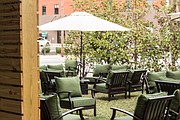In Haiti, it doesn't take long to go from wealthy to homeless.
"Even if you're rich, in 50 seconds you can be poor," says pastor Edner Demeze, who has been living on the streets of Port-au-Prince with church members since the earthquake hit and he lost his house.
Eight days after the quake, his wallet was stolen at gunpoint.
"We have no place to go for food and water if we have no money," he says. "People wait, look to the heavens and pray that God will send help or their next meal."
The future of Haiti is uncertain. The injured are being treated medically in the short term, but then must go home with gaping wounds, some from amputations. Some may heal properly but starve later.
On Thursday, a teenage boy was shot dead by Haitian police officers for stealing rice. People gathered around his limp, bloody body.
Dr. Chris Young from Erlanger hospital has been to Haiti on several medical missions, but he says the earthquake has raised the misery to an all-new level.
"The conditions were bad before, but now they're overwhelming," he said. "There's not enough doctors or hospitals in Haiti on a normal day.
"The number of patients who still need to be cared for is still great, so it's going to be many weeks and months before the medical care is going to be delivered here in Haiti," said Dr. Young, an anesthesiologist with Anesthesiology Consultants Exchange and board member of the Signal Mountain-based American Haitian Foundation.
Aid and medical vehicles from Qatar, Iraq, Israel, Venezuela, South Africa, Germany, Italy and Poland can be seen on the streets of Port-au-Prince. The Israelis are said to have the best medical care for victims, and medical personnel from around the globe have been impressed by the Israeli medical team.
Joel Hess, a long-term missionary in Despinos, Haiti, about a 20-minute drive northeast of Port-au-Prince, has driven his 1987 Suburban into areas where aid has not yet reached and used the vehicle as a makeshift ambulance. The injured are brought to the Haiti Gospel Mission medical clinic run by him and his wife, April.
Most days at the clinic, Mrs. Hess, even with a few extra helping hands, is overwhelmed, overtired and overworked. Yet, even with the overwhelming number of patients she now sees, she still tells her husband to leave, get on the roads and find wounded people.
Such people can be found in villages, carried on stretchers or pushed in wheelbarrows down the roads by family members whose only hope is that a passing vehicle will offer them a ride to a hospital.
Day in and day out with no food, no water and in the heat of the sun, people look to hitch rides to hospitals. They pray their wounds aren't bad enough to kill them, but are severe enough to not be turned away at a hospital.
The hope of many aid workers and medical personnel is that Haiti becomes bold text on the global map of needed aid. Meanwhile, Haitians live moment to moment on a thin line between life and death.
"The sense that this earthquake has brought attention to this, as some people think, Godforsaken place, I think is hopeful," said Dr. Chris Moore, an emergency medical physician from Erlanger hospital who is treating earthquake victims in Haiti.
The test will be once everyone is gone, Mr. Hess said.
"When all of the doctors go. ... When all the U.S. troops head out. ... when all that stuff kind of dies down, we're not having tremors, houses are getting fixed," he said, "I just hope people remember how devastated this country was before the earthquake and how devastated it is now."
Those who've worked in Haiti before say they do it for the people, for the Haitians, who are clever and live life to its fullest.
"Every time I'm here I ask myself, 'Why would I ever come back?'" said Dr. Moore, who is on his sixth medical trip to Haiti. "And it has a lot to do with the gratitude. They are suffering so much and yet there are no complaints. They're full of life, they accept hardship, (but) they don't really consider it hardship. They consider it the way they live."
But pain is a way of life for most Haitians, said Bob Nunley, head pastor and founder of Good Rest Mission Orphanage in Beudet, Haiti.
"Haitians don't believe in crying," he said. "They are so used to hurting and not having anything, they don't weep."
